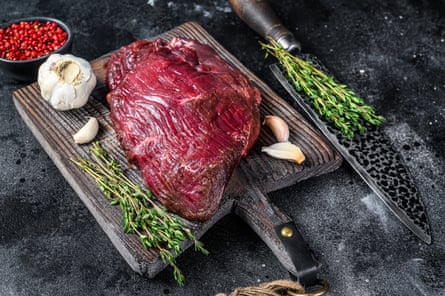Unmanaged wild deer herds could soon pose a threat to woodlands and important wildlife habitats in Britain because the commercial market for venison has collapsed during the pandemic.
Many in the game industry as well as conservationists fear too few deer are being culled to keep the estimated two-million-strong wild herd, the largest for 1,000 years, at a sustainable size.
One of the country’s most prominent game chefs, Mike Robinson, who runs three restaurants, including the Michelin-starred Harwood Arms in Fulham, said deer had already been through two breeding cycles since the first national lockdown in March, with numbers set to grow rapidly. “People are not shooting deer because they can’t sell them to restaurants at the moment,” he said. “Perhaps 20% of the normal cull is being done … we are at the beginning of a very large hike in the deer population.”
Robinson, who also manages wild deer across 35,000 acres in Gloucestershire, Oxfordshire and Hampshire, said the price of venison had already begun to fall last year due to oversupply and cheap farmed imports, but the pandemic had pushed it even lower.
“Many restaurants, including mine, serve venison,” he said. “About 80% of the wild deer harvested in the UK goes to restaurants or the hospitality trade. But that sector is really struggling right now and demand has fallen through the floor.”
Game dealers have lost a large part of their business in the last 10 months. Alan Hayward, who co-owns Vicars Game in Newbury, Berkshire, said he usually took in 200 deer carcasses a week but now he was only getting in between 40 and 50. “There’s no demand, with all the restaurants closed,” he said. “I’m telling everybody to cut back and stop shooting.”
Hayward, one of the country’s biggest game dealers, said the price had dropped by a third since March: “Farm shops are a little bit busier but it doesn’t compensate for the loss of catering, which is 70 to 75% of my business.”
Wild deer herds grow by up to 30% each year, with the population expanding by 600,000 between May and June. With deer stalkers not culling as many animals, concerns are growing that already large herds could eventually devastate woodland habitats for other species.
Gareth Fisher, an RSPB ecologist, said excessive deer populations had a detrimental impact on the habitats of many birds, including nightingales, warblers and willow tits. “If you’ve got lots and lots of deer then you tend to get more uniform habitats where there are fewer niches for the other species,” he said. “That’s the big issue.”
Fisher said that if deer were not controlled, species such as nightingale would lose out. “We are not looking to completely remove deer,” he said. “We very much appreciate that deer are an important part of the ecosystem, but the deer population needs to be sustainable. There are no natural predators that are going to keep the deer population in balance so humans have to take on that role.”
Martin Edwards, head of deer management at the British Association for Shooting and Conservation, which represents thousands of stalkers, said it was crucial to cull the female deer in the winter months.

“If we don’t cull them now, come the spring we will see a massive increase in the population. Also, this is the time of year they will do the most damage to the woodland because there’s not a lot of food elsewhere for them. They will destroy any young trees unless they are protected.”
The Forestry Commission, the government department responsible for protecting woodlands, is so concerned it has set up a national wild venison working group – made up of woodland managers, shooting groups and venison suppliers – to boost consumer demand while helping to protect the environment.
The commission urged landowners to continue culling wherever possible to protect biodiversity and woodlands. “The management of wild deer continues to be part of sustainable forestry in England. However, high-density populations can have negative impacts on the establishment, management and biodiversity of woodland,” said a spokesperson.
Robinson, who was selling deer to 15 Michelin-starred restaurants before March, said the solution was to encourage the British to eat more venison. “If the public eat more venison then this problem will naturally start to go away because the price will go up,” he explained. “There will then be more incentive to shoot deer.”
He stressed it was not a blood sport but part of managing the landscape. “There is no sport involved. This is management,” he said. “They are wild, incredibly intelligent, social animals. I have huge respect for them. I don’t like shooting deer. It is a sad experience but it absolutely has to be done.”
Venison is increasingly regarded as a healthy, sustainable and readily available alternative to other types of red meat. “Deer are the most amazing sustainable food asset in Britain,” said Robinson. “You’ve got this large protein which has no cholesterol and is full of antioxidants… with none of the health issues that come with red meat.”
The British Deer Society, which promotes deer management, argues that culling should be carried out humanely and only where there are problems. “We recognise the need to keep deer numbers in check,” said Charles Smith-Jones, the society’s technical adviser. “But we are concerned about the means. It has to be done humanely. You don’t just go out and shoot any deer you see – there has to be a process.”
